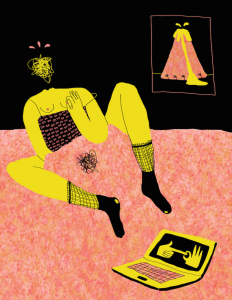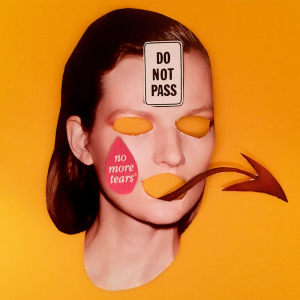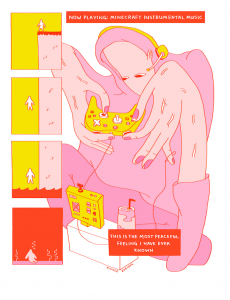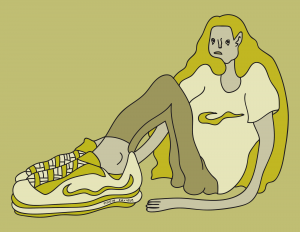We get it— comics have officially breeched new media. We are in the “third phase” of Marvel’s 21 movie Infinity Saga; DC trails closely with an 18 film revival following the endearing debacle of George Clooney’s bat nipples. I remember when my mom took me to see Spiderman in the early 2000s— this version apparently recused from the Marvel anthology we’ve endured the past 12 years. After a two-hour run time, I left with complicated (read: pre-pubescently horny) feelings about Toby Maguire’s upside down kiss with Kirsten Stewart, and little interest in much else. Blockbuster superhero flicks were mostly a write off for me from then, and any interest I had in graphic novels was subsumed by quirky, queer-friendly shōjo manga like Angel Sanctuary, Clover and Fruit Basket. I didn’t fall back into Western comics until my friends introduced me to less action-oriented works like Ghost World, which was one of the few titles in my library that took a gander at the peculiarities and loneliness of North American girlhood.
Aside from Clowe’s graphic novel, I remained unconvinced that most commercial comics were interested in depicting the ungainly experience I had with my own body, with my own life, and how that impacted my confidence. Figures like Wonderwoman are undoubtedly empowering, but what is it like to aspire to an ideal so far from yourself, from your own life? I most certainly am not running around with a golden lasso and a waist cinched in a body-con suit that would have Kim K seething with envy. To me, most of our iconic female superheroes still felt as though a masculine gaze was factored into their imagining: their impossible bodies as unreal as their superhuman abilities, their invulnerability co-efficient to their sex appeal. If comics are supposed to draw in the everyman to show us how we could all be more than ourselves, they immediately lost me, a girl looking for enough courage to live the life I already had.
So who makes comics for the common, confused woman like myself? Enter Nicole Zaridze out of Toronto, and her poignant, hilarious web comic Black Pants Club.
vs_smushy put it best when they said, “I wanna live in this alternate universe where everything is manufactured by Nicole Zaridze.” I couldn’t agree more— this alternate universe depicts all the nooks and crannies of the modern millennial life: from weird Internet spam, to sexting, to anxiety and mental health, to masturbation and sex work, to days where you cuddle up with your friends laughing at stupid texts your ex sent you.

The sweet confusion of self-exploration
Her illustrations have been featured in Sorjo Magazine, and she’s found ways to incorporate a multitude of influences, from childhood books like Robert Munsch’s Makeup Mess to illustrator Natali Koromoto’s work. Zaridze’s illustrations have a tender self-awareness to them that makes its way to the surreal, especially and when paired with her vivid palette and soft, sweeping line work. I fangirl-ed my way straight into her inbox, and she was kind enough to take a moment to chat about her art and what drives her incredible illustrations.
You can find her webcomic here. And don’t forget to show her some love on Insta!
Do you have any favourite: zines? comedians? cartoonists? writers? films? Can you talk about them and how they influence your work?
My favourite cartoonists/artists:
Micheal DeForge, Tara Booth, Matt Furie, and Patrick Kyle. I think their books and zines are all fun and colourful and they’re definitely a few artists that have influenced my work the most. I feel like reading their zines and books opened my eyes into how “weird” zines and comics can be.
A few other favourites of mine: Josh Engel’s series on Instagram is also very inspiring to me by the way he tells stories so well and in such short formats.
Polly Nor’s illustrations on female issues and vulnerability inspired me to be vulnerable in some of my drawings.
There’s so many favourites, I can go on and on.
Comedians:
Ok this is probably going to be a run on sentence but Chelsea Peretti’s sarcasm I live for, I love Eric Andre’s chaotic-ness, Chris Fleming’s “Company Is Coming” is just EVERYTHING to me, ex-viners such as Zachary Piona and Drew Gooden are really funny to me, and Casey Frey (also an ex-viner) and his weird humour is everything I live for as well. Just weird, sarcastic, awkward, odd humour with good timing. Love it.
Films:
Very into indie films, (Me, Earl, and the Dying Girl is my favourite film ever) horror/psychological films, anything that uses colour and composition to their advantage…I’m incredibly influenced through that. Some films that were influential for me that come to mind right away is The Florida Project and We Need to Talk About Kevin. Also Youtubers such as Julien Solomita inspire me a lot. Julien Solomita, for example, does really smart and creative editing in his videos (such as his quick cuts) that are super inspiring for how I format my storytelling in my comics.
Black Pants Club is so iconic in a way that I feel that these are friends that I know. Who are they? And where are they from?
All these characters are different versions of me. They’re not based on anyone. Obviously, you can look into any one of their personalities and think hey, this is this person! I can name a bunch of my friends who fit into the personalities of my characters, or the situations my characters are in, but honestly, they’re all me. All 5 of them are just me running around in my head 24/7.
The two characters Alex (the dark haired one with the yellow shirt) and Angel-007 were actually characters I created in my comics class last year for a zine assignment that we had to do. After that semester ended, that summer, I noticed I had these other characters in my sketchbook that kept popping up so I combined all of them into one universe, and they’ve been pals every since! I had a few stories in my sketchbook from 2017 but I didn’t really know what to do with them, or didn’t have enough motivation to really start fleshing the comics out, but finally, now, in 2019, I’m working on their stories and I’m very invested in them.
What is your process when approaching collage?
There is no process. I have no idea. Maybe trying to pre-plan a way that I want the viewer’s eye to follow around the image, but other than that, I’m just going back and forth between different pictures and sticking whatever I think is best. I’ve only made one collage that I really enjoyed, so I don’t know…maybe I should do more… With collage, I like to be chaotic and also organized at the same time, like my comic and illustration work. I like finding that balance. And I really like mixing text with simple imagery, so I would focus on that a lot.

One of Nicole’s dope collages
There are themes that run though your work: self-image, loneliness, sexuality, one’s relationship with their body, friendship. What about these themes speaks to you, and when you share your work, what are you hoping most people take away?
I choose to illustrate and write about these themes that I find myself struggling with a lot. It’s really helpful for me because it’s a way of journaling, and it really helps with my mental health. It’s also a good way to really break down ideas, thoughts, situations, and experiences to become humorous or light hearted, just to not take things so seriously sometimes. I want people to connect with these “journal entries” and know that we all deal with the same ideas and thoughts and also that we shouldn’t be so hard on ourselves. Like, stop being dramatic and let’s laugh for a bit. It’s important to talk about these themes and I believe that it’s important for me to build a community with my work.
I don’t want sympathy and I don’t want people to feel bad when seeing my work. Of course I make sad content sometimes, but overall I want people to feel comfortable and heard when looking at them.
I sometimes get messages saying “This was great but are you okay?” or “I kinda feel bad for you” which is weird because I feel like I’m touching on some pretty basic emotions that many people can relate to…and it’s like, don’t feel bad for me just because I’m being vulnerable about things. Making art surrounding these themes isn’t me going “boohoo, my life sucks, feel bad for me” it’s more of a “ok I feel like shit, let’s be funny about it.”
I don’t want sympathy and I don’t want people to feel bad when seeing my work. Of course I make sad content sometimes, but overall I want people to feel comfortable and heard when looking at them. These themes are things that I know I will always struggle with, and being open about them is really comforting for me. I’m really grateful to have a platform and an audience who get it. I just make weird drawings about my weird feelings and hope that someone gets it. And someone always does.
How have digital tools changed your art?
THE UNDO BUTTON HAS SAVED ME FROM LOTS OF AGONY. I’m a huge perfectionist, especially when it comes to line work, so it really helps to just have buttons that will have quick fixes for you. Some say that’s a bad thing, for people to rely on technology to fix their artwork, but I have a really simple and basic and flat style anyway…I stopped working traditional about two years ago and there wouldn’t be much difference if I decided to paint all my work now. I think working digital has made me become more confident with my graphic style. I can also experiment easily through digital tools such as with warping and distorting that helps me push my exaggerated and loopy drawings. Also, to have the ability to place 40 different effects and textures on one layer and almost blow up my laptop? Pretty cool.
You have amazing self-portraits! Can you talk about your approach? What do you think makes a good self-portrait? And what do you think typically influences one? Are there any artists you admire in terms of their self-portraits?
Thank you! All of my self portraits were school assignments, (I don’t do them for fun, I dislike painting very much) so my approach really depends on the assignment brief. Honestly, self portraits stress me out. I’m always thinking “do I actually look like this,” “who is this” “wait why do I look like that from that angle” so…it’s a rough time. I think a good self portrait is a portrait where you feel an emotion or a story behind the person you’re looking at. I really like expression-based portraits or portraits that are exaggerated, even though my self portraits aren’t that. I love the non-conventional portraits. Those are really cool. They tend to make you look at a person in a completely different way. And they don’t have to be just your face, they could be any part of your body. I discovered Jenny Saville in some of the power points we had in painting class. She has amazing figure paintings that focus on the body through different perspectives.
I think self portraits are really personal, and are a view of who you are, or what you want the person to believe. I don’t think being anatomically accurate is the most important thing in a portrait. Photographers such as Ana Mendieta, Claudia Cahun are really interesting to me, they both explore gender roles with their self portrait work. Frida Kahlo is also a favourite of mine.
Who is your work for? (I mean, aside yourself!)
I always say my work is for teenagers and/or young adults, because that’s who I target, but they’re for everyone. Maybe not children. But everyone else. They’re for people who like to complain a lot about the inconveniences they have to go through, and people who are struggling with the horrors of everyday life. My work is also for people who have a sense of humour. If you don’t have one, get out.
I love this comic as well because it shows people accessing technology to connect and be understand or find catharsis. I think a lot of people are cynical of people our age and how we use technology. Can you talk more about that? Also, what is it like having your work on social media, which is in itself so interactive?
Yesss, I love that word!! Catharsis. I know people say that technology has brought people to become more isolated than ever, but I like to think that technology has brought people closer together. I think technology has connected people in so MANY ways: we can all share huge amounts of information, share jokes, respond and react to news together, make friends online, etc. But I do think that the amount of info we receive is crazy and too fast, so being online and exposed to all of this content gets really overwhelming sometimes.
There’s this comfort of putting all your emotions into the void.
Going back to the word catharsis, and the good of technology, technology is being used as a form of comfort, I think. The internet is kind of like a big hole that you can just put stuff in. For example, you’re ranting about your day on Tumblr where nobody really cares about what you’re saying, but there’s this comfort of putting all your emotions into the void.
I really am lucky to have platforms where I can share my emotions onto and have an audience where they also relate to having those emotions. It’s really comforting, again, to have people agree or relate to these things. Or, to not relate to certain things, but are now open at the fact that these situations or emotions happen. It’s a discussion. I like that we can talk about these feelings openly.

The soothing power of Minecraft
I don’t care about the likes anymore, but I do focus on having that interaction with my audience and having my work reach as many people as possible because that’s my whole point of making my art. I want it to reach as many people as possible. Maybe they won’t LOVE it, but just to make a person chuckle or feel something is cool for me.
Because of social media, I am more in-tune with the art scene all over the world, I have connected with amazing artists, and connected with many people that I’ve gotten to know on both personal and professional levels. And, social media has allowed me to have so many creative opportunities that I would have never thought I would get. So I’m really thankful for that.
How did you get into art/illustration? Did where you grow up influence your art? And how did when you grew up influence your art?
I was always interested in art, but I never really became interested on a personal AND professional level, until university. I was in an art program in high school, and I decided that I wanted to continue doing art because I felt like that was the only thing I was good at. Because of the art program, I discovered OCAD University because we had a trip to go there every year to see the graduation show. So I became really inspired through that, and realized that Illustration was something that I wanted to learn more about.
When I got accepted to OCAD, is when I began to research and discover artists and work that I enjoyed. Not only for Illustration, I was exposed to photography, graphic design, ceramics, etc. I didn’t really do that in high school. I knew Van Gogh and I liked two cartoonists but I really dived into what the art world has to offer when I started working towards being a professional artist.
I lived in Toronto, Canada my whole life. Being in the city means a lot of social life so I encountered a lot of bad, awkward, and/or funny situations and experiences that help my art a lot. Toronto is very diverse, which is so important for an artist. Coming across so many different individuals opens your eyes to different ideas, and cultures…you get out of your bubble that way.
Being in the city has also given me the opportunity to go to art galleries easily. I’m fortunate enough to have my school placed right next to the Art Gallery of Ontario, so that’s really cool. Living in the city gives you many opportunities and benefits, and I didn’t use those benefits as much as I should’ve. I am now though. The city allows me to be involved and be surrounded by different experiences of mine AND other people, experiences that I can’t experience from the comfort from my own home. There’s only so much you can get inspired by when sitting in your room and being on Pinterest.
How would you describe your work?
My work is weird and personal. My work is story telling. I like twisting boring, bland and mediocre scenarios into funny and colourful illustrations. I’m just a cartoonist who doodles. I don’t think I do anything incredibly amazing or revolutionary, but I do think the work I do is important. I draw all the things that bother me, or things that I find funny, and I want to share that with everyone. I want people to feel connected to weird work. Like “haha, that’s weird, but I totally get it. And I feel comforted by it for some reason.”

A figment of Nicole’s imagination, flexing on you
I’m always here complaining about shit, and I think it’s okay to do that. Everyone thinks that you have to get over your feelings and experiences that bother you really quickly, and I’m here saying nah, we’re gonna address this and complain about this together, BUT also having to remember to let go. So I have a mix of really depressing content and inspirational content. But that’s going through the cycle of having ups and downs. I don’t want to end this interview all philosophical but yeah, it’s life. My work’s about life!
